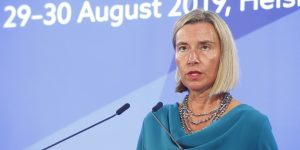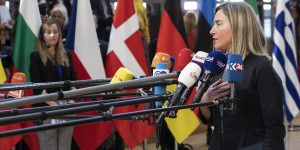European Parliament, Strasbourg 9 September 2015
Grazie Presidente,
Frans (Timmermans) said it very well: this is a defining moment, a defining moment for our Union. Words are important, and the refugee crisis we are facing puts our deepest values – even our identity – to the test. It is a moment of truth: it will show if we really are European, and if we really are a Union. That’s it. Our responsibility to protect human life and human rights. Solidarity, among Member States and towards those who are most in need.
But this is also a test for our international credibility. Don’t think we can sponsor human rights around the world if we don’t guarantee the highest asylum standards inside our Union. Don’t think or don’t even imagine that we can promote cooperation among parties that are at war at this moment, if we don’t accept “the other” inside our own communities and if we don’t manage to find unity among ourselves.
Our external credibility depends highly on our internal coherence and consistency. We need to be aware of that. Don’t imagine there can be an only external response to the crisis – as there could not be an only internal solution. The two dimensions of our action – internal and external – reinforce each other, or weaken each other. Like it or not, we have to face this.
To be credible, preaching well is not enough. We must act well, we must act fast, and we must act united.
Today we present a Communication setting the way forward for all the external action needed to address this crisis. We all know there is no magic, quick fix to the crises we have around us. All measures we are taking will deliver results in the medium and long term. Still, we must act now. I know it is hard for politicians to explain actions that will pay back in years, but if we don’t do that responsibly, the generations coming after ours will face the same problems again and again.
Let me say our external action finds us united, for once. This is not enough, we must find unity on our internal policies too. But it is crucial.
The first priority is saving human lives. The (Commission) President outlined how much we stepped up our work in this respect, and how many lives this effort saved.
Second, let’s address the root causes, and I’ll go back to that.
Third, as importantly, fight smugglers and traffickers of human beings all along the routes, not only at sea. This is a security issue: the finance flowing from smugglers can support all kind of criminal activities.
Our strategy has been clear and consistent since the beginning of our mandate. We cannot focus only on the last mile of the tragedy and forget about the other steps of a refugee’s Odyssey.
Most these people coming together to Europe flee from conflicts and persecution. This is the first issue we need to address. Four million have fled Syria. Between Syria and Iraq, more than ten million have left their homes and are internally displaced. Let me say one thing: we have rightly focused in these months on minorities in need of protection in the Middle East – Christians, Kurds or Yazidis. We must support their right to stay in the land and the communities where they have been living for centuries. But let me also say very clearly we cannot protect them only when they are far away from us, we have the duty to protect them also when they are close to us.
The long term answer, obviously, is putting an end to wars, facing the threat of Daesh, starting processes on national reconciliation. The deal we reached with Iran, although primarily a non-proliferation deal, can open the way to new possibilities. The work with international and regional partners in this direction has already started.
Second, we are working with the international community, mainly with UN agencies, with the countries of transit and those who host an impressive number of refugees. We have mobilised almost 4 billion euros in humanitarian and development aid to assist displaced Syrians within their country, but also in Jordan, Lebanon, Turkey and Iraq.
There is a very specific case: Libya. Not a country of origin and more than a country of transit: an open corridor. As you know very well, as we debated this many times in this very Hemicycle, all our efforts have been spent, day and night, together with the UN Special Representative Bernardino Léon, to try and reach a national unity government. This would allow us to partner with the Libyan authorities to manage what is now a corridor.
Let me also stress we must focus to the South of Libya. If we only focus on Libya’s sea border, and forget of Libya’s land border, we will never manage to solve this issue. This is why I have started an unprecedented dialogue with the countries of Sahel, in particular with Niger but not only. And today we are putting forward the proposal of a trust fund for Africa, to promote economic opportunities, development, security and a better management of irregular migration in partnership with African countries.
The (EU) Institutions will provide 1,8 billion euros. I expect all Member States, all of them, to do their fair share. Don’t ask for European cooperation, and then refuse to put the money for it. Remember this when we’ll come to discuss the budget. We have to show coherence in our decisions.
A regional trust fund for Syria has already kicked off. The first contract opened through the Fund deals with schools and education – let me stress this. This is in investment not just in the future of the country, in the future of the region, but also on our security. This is the best investment we can do against terrorism and radicalisation.
Thirdly, and I conclude: we are fighting those who trade on human life, the smugglers’ and traffickers’ networks. We are doing this together with transit countries, in partnership, and we are doing this in the Mediterranean. Our naval operation in the Mediterranean has now fulfilled the objectives of its first phase: we gathered intelligence and information on the smugglers’ routes, assets and strategies. Even through this first phase, and in just five weeks, we would have been able to go after the smugglers in 16 cases, bring them to justice and capture their vessels. That’s why I proposed to Member States, in Luxembourg last weekend, to move to phase two, in the high seas, in full respect of international law. And I asked Member States to contribute with their assets to the mission. This is an opportunity for us to show that when we have sense of unity and urgency, we can manage to use our military tools, which we already have.
But there is something I am proud of: in these very first weeks of common action in the Mediterranean, we have saved 1,500 lives of men and women at sea through our operation.
The way forward: We have the Valletta summit on migration in November, bringing together leaders from European and African countries (those of the Rabat and Kartoum processes, as well as the African Union Commission). We have the high level conference on the Western Balkan route – the two routes have to be dealt with the same urgency.
We need to realise as Europeans that this is not just a time for emotions. That is the easy part. Let me be cynical. As politicians, we are not requested to express our emotions. We are requested to take decisions that are consistent to our emotions. Emotions are not enough: we need to act, and this is the time.
This wave of emotion regards our public opinion and it can change, we must be aware of that. We must finally take responsibility to live up to our values, to the values of our history, to the challenges of the most difficult times in our recent history, to our global role.
What is at stake? As Frans (Timmermans) said very well – is not just the life of human beings (and one life is too much) but also the state of our European Union.
https://www.youtube.com/playlist?list=PLJmEREKFYU8Wr4LThlb2iO9vKlyWkf3-E



